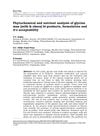
Thermal spring waters and their microbes could be good for skin health and treating some skin conditions in skincare products.
 February 2023 in “Scientific Reports”
February 2023 in “Scientific Reports” Cold Atmospheric Microwave Plasma (CAMP) helps hair cells grow and could potentially treat hair loss.
 January 2023 in “Annals of dermatology/Annals of Dermatology”
January 2023 in “Annals of dermatology/Annals of Dermatology” A substance called miR-1246 may help treat severe hair loss by reducing certain immune cell activities.
 November 2022 in “Arab Gulf Journal of Scientific Research”
November 2022 in “Arab Gulf Journal of Scientific Research” Taurine is important for many body functions and its deficiency can cause health problems.
 July 2022 in “Biomedicines”
July 2022 in “Biomedicines” 4-Aminopyridine improves skin wound healing and tissue regeneration by increasing cell growth and promoting nerve repair.
 January 2022 in “International Journal of Medical Sciences”
January 2022 in “International Journal of Medical Sciences” Cedrol may be an effective treatment for colorectal cancer.
May 2020 in “Authorea (Authorea)” Olfactory receptors found outside the nose may offer new treatments for diseases like cancer and help in wound healing and hair growth.

Activin A and follistatin control when ear hair cells form in mice.
May 2019 in “Journal of Acupuncture Research” Sebalgukhwa-san (SGS) can help treat hair loss without liver toxicity.

Activin A promotes ear hair cell development, while follistatin delays it.
March 2018 in “The journal of applied laboratory medicine” The rash on the infant indicated a serious underlying condition.
 March 2012 in “Hair transplant forum international”
March 2012 in “Hair transplant forum international” Environmental factors and chemicals might affect hormone balance and contribute to common hair loss.
 February 2023 in “Journal of Advanced Research”
February 2023 in “Journal of Advanced Research” A new method using Platelet-rich Plasma (PRP) in a microneedle can promote hair regrowth more efficiently and is painless, minimally invasive, and affordable.
Targeting CXXC5 and GSK-3β may help treat male pattern baldness.
200 citations,
August 2009 in “Experimental dermatology” Eating high-glycemic foods and drinking milk may worsen acne by increasing insulin and IGF-1 levels.
4 citations,
January 2019 in “Tropical animal health and production”  3 citations,
November 2018 in “Journal of cellular physiology”
3 citations,
November 2018 in “Journal of cellular physiology” Serenoa repens and N-acetyl glucosamine/milk proteins complex may help with hair growth and prevent hair loss.
9 citations,
October 2019 in “Journal of Physics Conference Series” Herbal shampoos with goat milk and natural extracts could be good natural alternatives to commercial shampoos.
7 citations,
June 2012 in “Journal of dairy science” Bovine milk fats applied to mouse skin can promote hair growth similar to known hair growth treatments.
 4 citations,
July 2013 in “Journal of Dermatological Science”
4 citations,
July 2013 in “Journal of Dermatological Science” Pregnancy right after giving birth in mice lacking IL-10 causes milk that leads to liver issues and hair loss in their babies.
 1 citations,
May 2022 in “International Journal of Health Sciences (IJHS) (En línea)”
1 citations,
May 2022 in “International Journal of Health Sciences (IJHS) (En línea)” Soybean milk and okara are nutritious, have health benefits, and make tasty, long-lasting food products.
 April 2017 in “Journal of Investigative Dermatology”
April 2017 in “Journal of Investigative Dermatology” Cow milk sugars increase fat production and inflammation in skin oil cells.
 22 citations,
January 1985 in “Annals of Internal Medicine”
22 citations,
January 1985 in “Annals of Internal Medicine” Minoxidil in breast milk may harm nursing infants.
8 citations,
February 2005 in “International Journal of Cosmetic Science” Applying a special soy milk extract on skin can make it more elastic and hydrated.
 47 citations,
June 2012 in “Genes & Development”
47 citations,
June 2012 in “Genes & Development” A mother's western diet can make her milk toxic, causing inflammation and hair loss in babies.
October 2024 in “Annals of Allergy Asthma & Immunology”  39 citations,
January 2013 in “Indian Journal of Dermatology, Venereology and Leprology”
39 citations,
January 2013 in “Indian Journal of Dermatology, Venereology and Leprology” Eating high glycemic foods and drinking milk may worsen acne by increasing insulin and IGF-1 levels.
 January 2024 in “Collagen and leather”
January 2024 in “Collagen and leather” The conclusion is that using bovine milk permeate to remove wool from sheepskins is eco-friendly and results in smoother, higher quality leather compared to traditional sulfide methods.
 September 2021 in “Journal of skin and stem cell”
September 2021 in “Journal of skin and stem cell” Lactium, a milk protein, can help reduce symptoms of skin disorders linked to stress and anxiety without side effects.
Anti-keratin antibody from cow milk makes damaged hair stronger and less likely to break.



















